By Jim Davis - Florida Catholic
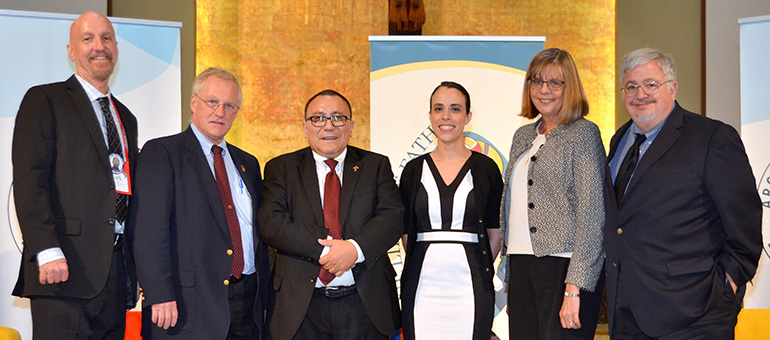
Photographer: JIM DAVIS | FC
Panelists pose for a final shot with Deacon Edgardo Farias, third from left, director of the archdiocesan Detention Ministry. The others include, from left, Mark Elliott, director of Floridians for Alternatives to the Death Penalty; George F. Kain, professor of justice and law administration at Western Connecticut State University, Ritchfield; Ingrid M. Delgado, associate for social concerns /respect life for the Florida Catholic Conference; Susan Recinella, a Catholic lay minister to families of executed persons; and Dale Recinella, a Catholic correctional chaplain for Florida's Death Row.
MIAMI | "The more you know about the death penalty," said Mark Elliott, "the less you like it."
As the director of Floridians for Alternatives to the Death Penalty, Elliott would naturally say that. But he had lots of company at a recent conference, From Justice to Mercy.
Here's what fellow panelist George F. Kain said about capital punishment: "The death penalty is a barbaric practice that has lost its place in society. For every group involved — police, attorneys, corrections officers, the execution team — it's traumatic.
"It's a death sentence for all of us. It destroys us as a people."
The topic was one of two, along with juvenile justice, at the first conference of its kind in the archdiocese. The seven-hour conference drew 200 specialists and volunteers Sept. 24 to Corpus Christi Church in Miami.
The conference took a two-pronged approach, of fact and advocacy. The goal was simple, said Deacon Edgardo Farias, the organizer: raising awareness of the two focus issues.
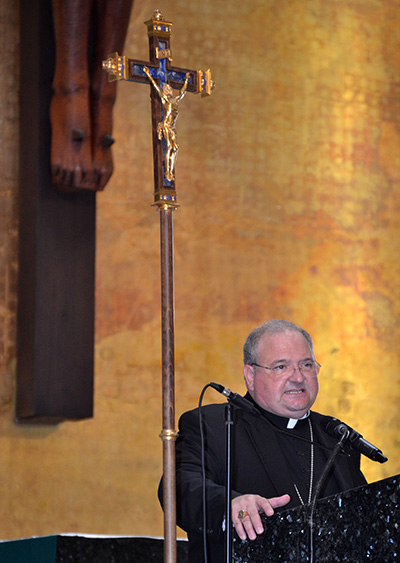
Photographer: JIM DAVIS | FC
Auxiliary Bishop Peter Baldacchino addresses the Justice to Mercy conference at Corpus Christi Church.
"We need more consciousness about respecting human life," said Farias, director of the archdiocesan Detention Ministry since 2006. "This is the first goal for government. We need to humanize the system. If not, it's not a government for the people."
Those attending came from a broad range of jobs and vocations. They included chaplains, lawyers, social workers, businessmen, volunteers in detention ministries and non-Catholic pastors.
"All Christians need to focus on social issues," said the Rev. Pierre E. Petit-Frere of Agape Church of God in Fort Lauderdale. "We should not be stressing only the theory of Christianity. We should be putting it into practice."
After a keynote address by Auxiliary Bishop Peter Baldacchino, the day settled into two panels of four persons each, followed by Q&A time. Providing Spanish-language summaries of their talks was Ingrid Delgado, associate for Social Concerns / Respect Life at the Florida Catholic Conference.
Reform not punishment
Florida's efforts to deal with young offenders go back more than a century, according to Elisa Quesada, a visiting law professor at Florida International University. She said the state recognized in 1899 that juveniles "needed to be reformed, not punished."
Over the decades, though, the state see-sawed between tough and compassionate approaches. With the widely reported murders of tourists in the late 1980s and 1990s, the attitude shifted from "If they do an adult crime, they do adult time," Quesada said. "They weren't being helped; they were being abused. Some juveniles got life without parole."
More change came with a 2012 Supreme Court decision that ruled children were different from adults, Quesada said. That led to reforms in Florida, and increasing use of "diversion" programs for youths instead of prison terms.
Miami-Dade's Juvenile Assessment Center, for example, routes them to various programs for treatment and rehabilitation, such as the State Attorney Growth and Enrichment Center (SAGE), a mentoring program.
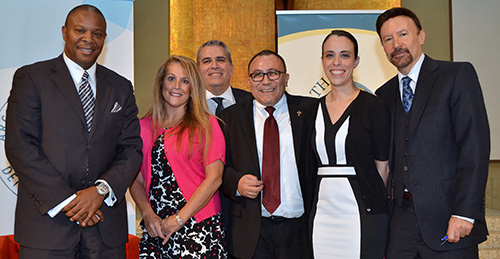
Photographer: JIM DAVIS | FC
Panel of experts discusses juvenile justice for the Justice to Mercy conference at Corpus Christi Church, Miami. From left are Morris Copeland, director of the Miami-Dade Juvenile Services Department; Elisa Quesada, visiting law professor at Florida International University; Carlos J. Martinez, public defender for the 11th Judicial Circuit Court; Deacon Edgardo Farias, director of the archdiocesan Detention Ministry; Ingrid M. Delgado, associate for Social Concerns / Respect Life for the Florida Catholic Conference; and Todd Bass, chief of the juvenile division for the State Attorney's Office in Miami-Dade.
"Something has been done right," remarked Todd Bass, chief of the State Attorney's juvenile division in Miami-Dade.
One rising problem is increasing gun violence since 2015, Bass said. "The juvenile system can't handle violent offenders. We can't even hold them more than 21 days."
That got some pushback from Miami-Dade Public Defender Carlos F. Martinez. He said that even violent young offenders can't grasp the consequences of their deeds, especially if they have been mistreated by parents and other adults.
"Yet we're hearing 'No mercy' if a juvenile has committed an offense with a firearm," Martinez said. "He is a human being — an undeveloped human being, not a fully developed, thinking adult."
He urged more latitude for judges to decide if a case should go to adult court or the juvenile justice system. "I see juvenile court as a court of mercy. Let judges be judges and decide cases on their merits."
No more executions
The afternoon session, bluntly titled "No More Executions!", launched a volley of attacks on capital punishment. Among them:
Sometimes, the innocent are executed.
The measure doesn't keep police safe, despite what some have claimed.
Families and friends of the condemned are not allowed to attend the execution.
The system condemns the poor and mentally ill, and people of color, more often than others.
Capital punishment even costs the state more — $1 million per person each week, five times the cost of life imprisonment.
Dale Recinella, a Catholic chaplain for Florida’s Death Row inmates, cited research he did for his book "The Biblical Truth About America's Death Penalty." He identified 44 conditions in the Bible for putting someone to death — and said that American law meets none of them.
"The only similarity is that someone gets killed by the government," he said. "My gut or emotions may scream for a death sentence, but that’s not in God's Word."
Alternatives to death penalty
Recinella added that the Bible also allows people to find alternatives to the death penalty, which would also protect innocent lives.
The issue is especially large in this state, said Delgado of the Florida Catholic Conference. From 2010 to 2015, she said, 16 counties in the U.S. sentenced five or more people to death — and four of those counties are in Florida, including Miami-Dade.
On the other hand, she said, 19 states no longer have a death penalty, and others have declared moratoriums on the practice. She added that the U.S. is in a minority of nations that allow capital punishment — along with places like China, Iran, Syria and Saudi Arabia.
"What kind of human rights company is that to keep?" Delgado asked.
What to do? The panelists called for people to pressure officials to reform the system through measures like phoning and emailing.
"There's a need for a grassroots approach," said Kain, a professor of justice at Western Connecticut State University, Ritchfield. "There's more than enough people to get the job done. It's a matter of connecting people."
Conference-goers said they felt encouraged at what they heard.
"The speakers brought so much great information and hope and light, bringing justice and mercy to both those issues," said Patrice Schwermer of Key West, where she is outreach coordinator for archdiocesan Catholic Charities. "We are moving in good directions."
Deacon Ray Aguado, coordinator of advocacy and justice for the Diocese of Pensacola-Tallahassee, applauded the youth diversion programs in Miami-Dade. He said the Catholic Church needs to be involved in justice reform.
"The Church is the moral compass," said Aguado, who was planning another prison ministry conference in Tallahassee Nov. 19. "The Church teaches how to treat those who are marginalized, who don’t have a voice. Everyone should have hope, even when they're in prison."
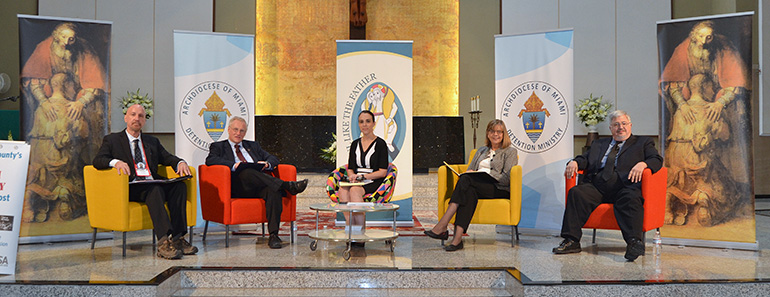
Photographer: JIM DAVIS | FC
Panelists call for an end to the death penalty during the Justice to Mercy conference at Corpus Christi Church, Miami. From left are Mark Elliott, director of Floridians for Alternatives to the Death Penalty; George F. Kain, professor of justice and law administration at Western Connecticut State University, Ritchfield; Ingrid M. Delgado, associate for social concerns / respect life for the Florida Catholic Conference; Susan Recinella, a Catholic lay minister to families of executed persons; and Dale Recinella, a Catholic correctional chaplain for Florida's Death Row.
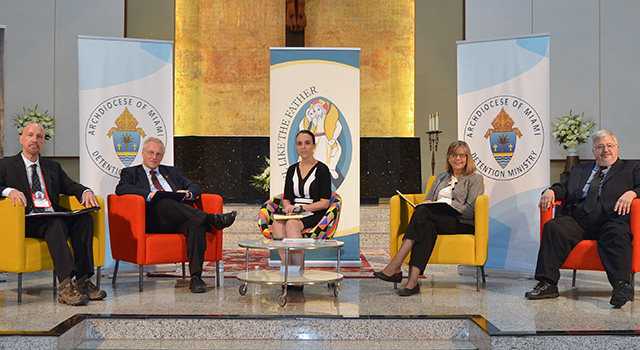

Comments from readers